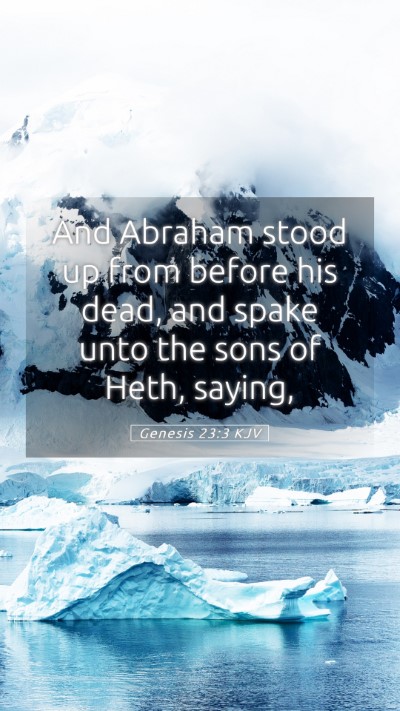Bible Verse Analysis: Genesis 23:3
Bible Verse: Genesis 23:3 - "And Abraham stood up from before his dead, and spake unto the sons of Heth, saying,"
Understanding Genesis 23:3
This verse marks a poignant moment in the biblical narrative, where Abraham is deeply affected by the death of Sarah, his wife. It provides insights into the cultural practices of mourning and the significance of land ownership in ancient biblical society.
Contextual Considerations
Abraham's mourning showcases not only his personal grief but also highlights the importance of community and burial practices among the Hittites. The son of Heth represents a group who would have a role in Abraham's future endeavors concerning the land.
Moreover, this moment sets the stage for Abraham's negotiations to secure a burial site, which ultimately has wider implications for the establishment and significance of Israel as a nation. His act of negotiating with the Hittites reveals both cultural sophistication and a deep-seated respect for boundaries and property rights.
Key Themes in Genesis 23:3
- Mourning and Grief: Abraham’s emotional response illustrates the profound impact of loss and highlights the humanity of biblical figures.
- Community Interaction: The interaction with the sons of Heth indicates the need for community support during mourning and the importance of respectful engagement in matters of land and burial.
- Negotiation and Trust: This scene emphasizes the importance of negotiation in ancient cultures, shedding light on how relationships were formed and how land was acquired.
Bible Verse Commentary
Commentaries on this verse by various scholars provide valuable insights. According to Matthew Henry, this verse demonstrates a mixture of sorrow and resolution. Abraham's grief does not prevent him from acting in a way that ensures his family’s future. Albert Barnes notes that the solemnity of the moment is underscored by Abraham's respectful approach to the Hittites and their customs. Adam Clarke elaborates on the social customs surrounding death and land, emphasizing that Abraham’s request for the land signifies a step towards securing a permanent heritage for his descendants.
Historical Context of the Verse
In ancient Near Eastern cultures, handling the dead was of utmost importance, and land ownership was critical for family legacy. The negotiation for a burial site reflects the customs of the times and the legal concerns of land transactions.
Abraham’s desire to secure a burial place for Sarah also symbolizes his commitment to the covenant God made with him regarding the Promised Land. It is a physical act of faith as he moves towards claiming the land that God promised to his descendants.
Application of Genesis 23:3 in Daily Life
This verse offers a profound reflection on how we handle loss and grief, prompting us to consider the importance of community and cultural practices in support of one another during difficult times. It encourages us to act with integrity and respect when engaging with others, particularly in negotiations and personal dealings.
Furthermore, it inspires individuals to be forward-thinking regarding their legacy and the impact of their actions on future generations. Just as Abraham sought to ensure a place for his family, we too are invited to consider how our choices affect those we leave behind.
Cross References
- Genesis 23:4 - Abraham’s request for a burial site.
- Genesis 49:30-31 - Significance of burial in family heritage.
- Acts 7:16 - Reference to Abraham’s burial place and lineage.
Conclusion
Genesis 23:3 serves as a rich source for Bible verse meanings and Bible verse interpretations. It is an invitation for Bible study insights that delve into human emotion, the importance of community, and the practicalities surrounding life and death in biblical times.


